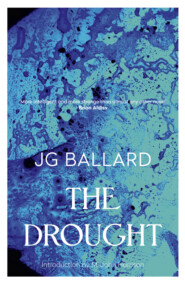По всем вопросам обращайтесь на: info@litportal.ru
(©) 2003-2024.
✖
The Day of Creation
Настройки чтения
Размер шрифта
Высота строк
Поля
Pleased with myself, in an absurd way, I strode forward through the trees. It was childish of me to have blocked the stream but I had created the spring the previous afternoon. Before I left I would warn Kagwa to replace the root-bole of the old oak, or the seeping water would undermine the airstrip.
My feet slipped in the damp undergrowth between the trees. Confused by the darker air below the canopy, I had strayed from the forest road. I blundered among the ferns and palmettos and fell to my knees in a pool of black water. I assumed that this was a stagnant channel, but even as I crouched there, shaking the mud from my hands, I could feel the pressure of a current against my legs.
I was standing in a jungle stream more than ten feet wide. It flowed through the trees, hidden by the dead lianas and debris of the forest floor. For some fifty yards it followed the road, and then swerved into the brush, seeking out the darker gradients that ran down to the lake.
As my eyes sharpened, I saw that the original stream had divided into several channels, only one of which had so far reached the lake. The others pooled in the hollows, seeping between the fallen trunks and turning the forest into a sombre bayou.
I returned to the forest road and set off towards the airstrip. I felt elated but vaguely guilty, and remembered a childhood visit to Kowloon with my parents, when I had broken the earth dyke that held the water within a small paddy field in the hills of the New Territories. By the time I returned to my mother and father, setting our picnic beside the parked car, the escaping water had run down the hillside and was washing the car’s wheels. Puzzled by the shouts of the farmers from the rice terraces above, my parents set off through the valley for another picnic site. It had taken hours for the moisture on the tyres to dry, hours of nervous excitement and small-boy guilt …
However, I already realized that this stream running through the forest would be a boon to Port-la-Nouvelle. Calming myself, I stepped from the trees at the eastern end of the airstrip. One of Kagwa’s sentries stood by the runway, rifle slung over his shoulder, throwing pebbles into the shallow brook that ran among the tree stumps and hillocks of the waste ground. He stared at my drenched clothes and muddy arms, as if I were a plumber who had just released some infernal stop-cock in the earth’s cistern.
I climbed the shoulder of the runway, following the stream’s course. The huge root of the forest oak lay beside the cavity from which the tractor had dislodged it. The black bull’s head, like the crown of a minotaur with its snake-like roots, the primal deity of the river, was now covered by a swirl of brown water, beer cans and aerosol cylinders. A steady current moved among the mounds of earth, flowing from a secondary source in the overgrown terrain to the north of the airstrip. Two hundred yards away, a small arm of the stream moved through the scrub, its green back already attracting two kingfishers that leapt from branch to branch of a baobab tree. By dislodging the dead oak from its bed, I had released a flow of water from an underground reservoir beneath my feet, and the hydraulic vacuum had cracked the natural containment wall. I assumed that the weight of the airstrip itself was expressing this trapped fluid, perhaps from a relic of the original water table of Lake Kotto.
Angry voices crossed the airstrip, an altercation that moved like a skidding stylus from French to German to Sudanese. Between the parked Dakota and the control tower Sanger had set up his aid station and television studio. A plastic tent with a transparent window flap served as the control booth. A portable generator behind the tower throbbed quietly in the sun and fed its current to the monitors within the tent. On the two screens mounted on a card table I could see a distant image of the journalists remonstrating with Sanger. Their exasperated gestures were carried from the unmanned camera fixed on its tripod in front of them, along a land-line to the twenty-foot-high local antenna secured to the roof of the control tower.
His safari suit crumpled after an unsettled night, Sanger was trying to pacify the journalists, while the Dakota’s pilot watched from the rice-sacks that lay slackly in the sun like the carcasses of a dream. The bookish young Indian, Mr Pal, stood at Sanger’s elbow, doing his best to interpret for him, while Miss Matsuoka strode about moodily in her flying suit. The remaining members of the team leaned against sections of the satellite dish, watching this quarrel with dour expressions, extras in a dubious film production cut short by lack of funds. Only Captain Kagwa seemed in good spirits. He gave a light-headed salute to the driver of the truck bearing my two suitcases, and then beamed serenely at the forest around the airstrip, as if expecting to see his magnified image projected upon the green canopy.
I assumed that his interview had taken place, transmitted on the local antenna’s weak signal to an audience consisting, literally, of the birds in the trees – and, no doubt, the sergeant in the police barracks recording the occasion on the looted video. Relayed later from the government station in the capital, it would guarantee Kagwa’s promotion to Major, if not Colonel …
Happy to leave him to his new fame, I stepped from the edge of the runway and climbed down to the stream. More than fifteen feet wide, it slid through the undergrowth, barely visible in the long grass. Fed by the main channel, pools of waters had formed in the waste ground, and now carried a regatta of used condoms, jettisoned by the French oil-company workers who had built their camp beside the airstrip. Looking down at this floating parade, I felt as if I had conjured up, not just this miniature river that would irrigate the southern edge of the Sahara, but the entire consumer goods economy which would one day smother the landscape in high rises, hypermarkets and massage parlours. As the scummy debris drifted past, I could almost believe that I had invented Professor Sanger himself, somehow conjured this third-rate television producer to serve as its presenter, the impresario of rubbish …
I walked along the bank, even more curious now to find the source of the stream. One of Kagwa’s soldiers stood naked in the long grass, washing his uniform in the water. He draped his camouflage jacket and trousers over a bale of telegraph wire that lay coiled in the shallows. Whistling through a stem of dried grass, he seemed almost to be talking to the stream, guiding it towards him, just as his primitive forebears in the forest had found the magic to summon rain and turn winds.
One engine of the Dakota began to whine, then coughed into a throaty roar. The plane would leave in fifteen minutes, but I placed the sound at the back of my mind. Leaving the naked soldier and his flute, I followed the stream as it flowed towards me from the heavier undergrowth. Narrower here, the stream had concealed itself among the overhanging branches that thrust themselves against my chest. I pushed them aside, and waded through the knee-deep water.
The walls of a steep culvert enclosed the stream. Holding to the lianas which hung from the boughs above me, I climbed over the trunks of dead palms lying together like the timbers of a rotting raft. Then the culvert opened into a green basin, a forest drawing-room shaded by curtains of moss and dead creeper. In the centre sat the hulk of a rusting motor car, thrown into this makeshift tip by the construction workers of the oil company. The shallow water flowed through the radiator grille of the car, emerging between the glassy eyes of the headlamps as if from a fountain’s mouth. Behind the rear wheels the grass was sodden, the water leaking from that same underground reservoir which I had fractured.
I kicked the damp grass, and scattered a spray of water into the rusty interior of the car. The Dakota’s engines sounded from the airstrip. The slipstream raked through the trees, and a whirlwind of dusty air seethed around the basin. Behind me, the sunlight briefly touched a metal rod pointing through the leaves, the barrel of a rifle trained upon my chest. Too startled to run, I saw a small figure crouching among the tamarinds, head hidden by the fronds that thrashed its shoulders.
The Dakota completed its take-off check at the western end of the runway, and the trees in the basin settled themselves. The armed figure had vanished, presumably one of Harare’s guerillas sent here to keep watch on Captain Kagwa and the cargo brought in by the Dakota.
As I left the basin and followed the stream into the culvert I could hear the impatient engines of the aircraft. I guessed that the plane was waiting for me, and that the pilot would soon tire of standing on his brake pedals. But I was thinking only of the stream. Already I was convinced that by finding its source between the wheels of the rusting car I had somehow broken its magic, and that my wells in Lake Kotto would no longer be under threat.
However, even before I reached the waste ground beside the airstrip the stream was flowing more strongly. The current tugged at my calves, overtaking me in its rush towards the waiting lake. The pools of standing water among the hillocks had been drawn into the main channel. The foliage of the trees was more vivid, readying itself for the brighter world to come. The naked soldier was moving his clothes further up the bank. When I splashed past him, he raised his rifle as if I was some latter-day savage emerging from this floating jungle of condoms and cigarette packets.
The Dakota had aligned itself on the runway and edged forward through the swirling dust. Sanger stood by his makeshift television station, almost alone among his cameras and antennae. Ignoring him, I set off along the forest road towards the lake. A hundred yards away I saw an adolescent girl standing above the beach, the twelve-year-old with the infected ankle whose life I had saved. Her right foot still dragged the unravelling bandage. She stared at the lake, her hands dancing excitedly at her sides, and then scuttled away when she saw me approach.
I climbed the bank and stared at the sheet of silver water, rippled by the hot wind, that stretched towards the jetties of Port-la-Nouvelle a quarter of a mile away. Already the edges of the pool had touched the bows of the stranded car ferry and the white rudder of the restaurant barge beached on the shore beyond the cigarette factory. Little more than an inch deep, the water extended towards the line of drilling rigs, and had almost reached the nearest tower. The stream sluiced down the bank with the comforting splash of an ornamental fountain. My earth dam had been swept aside in a flurry of small heels. In the scattered sand were the prints of a child’s foot with slender but prominent toes.
For reasons of her own the girl was defending the stream, accepting some self-imposed challenge. She scurried through the trees, fierce eyes watching me from her pallid face, like a child-terrorist who had planted a bomb and was waiting half-fearfully for it to explode. Behind her she towed the filthy bandage, as if trying to confuse me by trailing this thread of her own blood.
I shouted to her, but my voice was drowned in the blare of the Dakota. It swept above the lake, barely clearing the forest canopy. I stepped into its trembling reflection and walked through the warm water towards the nearest drilling tower.
A silver arm of the lake had reached the well before me. I leaned between the trestle posts and peered into the bore, where a pool of dusty fluid rose through the discarded newspapers. A horn sounded from the police barracks. Captain Kagwa was waving to me from his jeep. He lowered my suitcases on to the wharf, shook his head in disapproval and drove away. No doubt he had assumed all along that I would stay at Port-la-Nouvelle and had thoroughly enjoyed the irony of my wells filling with water from the forest stream that I had accidentally created.
Kagwa or no, I would stay at Port-la-Nouvelle and reopen the dispensary. And I would defend my dry wells.
8 (#ulink_dd5838d1-9d72-5459-9fbd-940e365af9cc)
The Creation Garden (#ulink_dd5838d1-9d72-5459-9fbd-940e365af9cc)
‘We’re threatened, Mallory! Forget your dam!’
‘Go away, Sanger. Make a film about someone else.’
‘No! Doctor, it’s time to build an ark …’
A familiar shabby figure in a sweat-stained safari suit hailed me across the water. Sanger lounged back in the stern of his skiff, in relaxed good humour, as always when he saw me working on one of my various futile schemes. He watched me shovel the soil on to the crumbling wall that I hoped would be one shoulder of an earth dam. As hard as I worked, the current carried away the damp clods.
Mr Pal, his scientific adviser and general factotum, stood in the bows, punt pole sunk into the bed of the stream. He held the craft against the current, staring at my modest efforts with an expression of deep gloom, and then confided his verdict to Sanger.
‘Median depth is now three feet, Professor, rising approximately at one inch per hour.’ He spoke in a light educated voice, his diction giving a lilt of good news to his depressing litany. ‘Current estimated three miles per hour, capacity six hundred cubic feet per minute. Flood table imminent.’
‘Mallory, did you hear Mr Pal? Flood table imminent.’ I drove the spade into the bank and rested my reddened palms on the handle. Somewhere below my knees a pair of mud-caked boots had vanished into the brown water. My shorts and chest were spattered with the red mud.
‘What are you doing here, Sanger? Do you want to interview me?’
Sanger gestured in an artless way, as if this was a prospect beyond all his dreams. ‘You don’t want to be interviewed, doctor. For you, television is vanity, the death-warrant of the human race written in 625 lines. Yes, you told me so, very bluntly.’ He spread a hand across the water, like a card-sharp about to tamper with a pack. ‘We might be looking for gold.’
‘Good, you’ll be able to pay the journalists to come back to Port-la-Nouvelle. And return my fifty dollars.’
‘Fifty? As little as that? I feel better about my debt to you. Every dollar you lend me is a deposit in the bank of friendship. Still, it might be worth panning here – there is equipment in the tobacco factory we could modify.’
‘Sanger, you’re wasting your time. As Mr Pal will tell you, the geology is against you. Anyway, this stream will soon cease to exist, once I’ve managed to divert it.’
‘Stream?’ Sanger beckoned Mr Pal to the bank. Holding the Indian’s arm he stepped from the skiff and stood beside me. He touched my shoulder in his frank and engaging way. Behind his dark glasses I could see his weak but curiously trusting eyes. ‘Stream, doctor? You still call it a stream? This is a river. You have created a river.’
His voice carried through the trees, catching the ear of the young Japanese woman who was photographing the channel. Still wearing her flying overalls, she followed Sanger everywhere, flitting about him like the Ariel of this threadbare Prospero. His eyes and his ears, Sanger called these two assistants, the shy young Indian with the mind of a breast-pocket encyclopaedia, and the busy-as-a-bee photo-journalist who ran here and there, endlessly performing the intricate mating dances that united nature and her camera lens. They were forever feeding him scientific facts and possible film locations. At times it seemed that nothing had any real significance for Sanger until Mr Pal and Miss Matsuoka had pre-digested it for him in the terms of an imaginary film documentary. Sanger existed in a fictionalized world, remade by the cliches of his own ‘wild-life’ nature films. These were not soap operas but soap documentaries. The makers of TV documentaries were the conmen and carpetbaggers of the late twentieth century, the snake-oil and fast-change salesmen purveying the notion that a raw nature packaged and homogenized by science was palatable and reassuring.
‘A river?’ I repeated. ‘Not yet. Strictly speaking it’s no more than a freak rise in the local watertable.’ We were standing below the shoulder of the runway extension, a few yards from the site of the original spring. All trace of the access ramp had been swept away by the rushing waters of the past eight days. The north-east corner of the runway had vanished, and a cliff of once compacted earth was now collapsing into the stream.
Whether stream or river, brook or burn, the channel was fifty feet wide. Draining from the unmapped forest swamps two miles to the north-east of Port-la-Nouvelle, it flowed past the airstrip to empty into Lake Kotto. Each morning when I woke in the trailer the light reflected from the surface rippled ever more brightly across the ceiling of the cabin. Already the western end of Lake Kotto was covered to a depth of twelve inches by a vast brown pool of silt-filled water that stretched six hundred yards from the quays beyond the tobacco factory.
All my drilling wells had been flooded. The line of towers stood like harbour buoys, linked to the shore by the charred sections of the viaduct. I had tried to defend the wells by building an earth rampart around them, a wall of dust which the advancing lake had soon penetrated. By the third day, when the last of the wells began to fill with water, I abandoned the effort and ordered the sergeant to return the tractor to the clinic.
Even then, a substantial delta had formed. This miniature river carried tons of fine soil and humus from the forest floor and deposited them at its mouth, where they lay in banks of silt as smooth as pillows of wet satin.
When I followed the stream’s course through the forest, past the airstrip and Nora Warrender’s breeding station, I soon found that the secret basin to which I had traced it no longer existed. The basin and the service road of the French oil-company workers had been obliterated by the strong channel that flowed among the trees, and which each day seemed to place its source ever deeper into the forest. Two miles to the north of the airstrip the stream was still ten feet wide, flowing through the scrub and undergrowth, but I was then turned back by a patrol of Kagwa’s soldiers. At night I heard the sounds of rifle fire and mortar shelling, and guessed that Harare’s guerillas had been drawn back to this unexpected supply of fresh water.
Kagwa seemed to concur. At first the Captain was eager to rid himself of this nuisance that threatened the airstrip, distracted his men, and altered the strategic balance of the arid region under his rule. After my meeting with the armed patrol he clearly suspected that I was acting in some way as an emissary between Harare and dissident elements to the south. But Kagwa merely warned me of the dangers of trying to penetrate too deeply into the forest, and then assigned three men to help me dam or divert the stream.
Even with their aid it was soon obvious the current was too strong for us. The earth dam we built at the mouth of the stream – a rampart of sand and soil driven over the delta by the tractor – was overrun within hours. A second, which we constructed using a section of the runway extension, was washed aside before we could bridge the two banks. Meanwhile the stream continued to grow, deepening and widening its channel, sweeping with it a freight of uprooted saplings, rafts of brushwood, and a legion of beer bottles and aerosol cans. Watching this tide of man-made rubbish, I could almost believe that this small stream was trying single-handedly to cleanse the continent of the garbage which the century had deposited there.
Within a week of my creation of the river, the first brown water reached the pier of the police barracks, and Captain Kagwa reassigned the three men, leaving me on my own. His mechanics were working on the engines of the police launch and the car ferry stranded on the beach beyond the cigarette factory. Already the bows of the restaurant barge – a floating bordello once patronized by the oil-company workers – were washed by the lake. The plaster goddess with yellow hair who hung below the bowsprit, crudely painted to resemble a future Queen of England, dipped up and down on the shallow waves, as if the venerable craft were preparing itself for the trade to come.
Meanwhile this mysterious stream continued to transform the forest. The foliage was brighter, and a green lustre filled the once blanched canopy, as if the stream had bathed everything with a subterranean light. As I walked through the trees, trying to devise some means of building an effective dam, I sensed around me the atmosphere of a new world. I breathed the fresh, Edenic air, almost believing that I had planted and watered a forgotten corner of the original creation garden. I felt light-headed on the sweet scents of blossom and rotting bark, and yet curiously at rest, as if I were waking into a dream that had slept within me since my childhood. I remembered the derelict kitchen garden of the house my father had bought in Kowloon, a miniature wilderness where I had played as a boy among tomato and cucumber frames overgrown with wild sugarcane. Rats and small snakes infested the deep grass, but I had made my child’s world there until, at the age of seven, my father had brought in a local contractor, cleared the ground and built an asphalt tennis court. However, even as an adolescent playing with my friends, I could still sense the lost jungle of the rubbish tip around me.
I waded in the silvery water, washing the dust from my arms and face. In my fancy I imagined that this stream was a forgotten tributary of the primordial river in the desert gorges of central Africa, where man’s primitive ancestors had broken their pact with the tree, the giant river which had descended beneath the Sahara and lain dormant for thousands of years.










